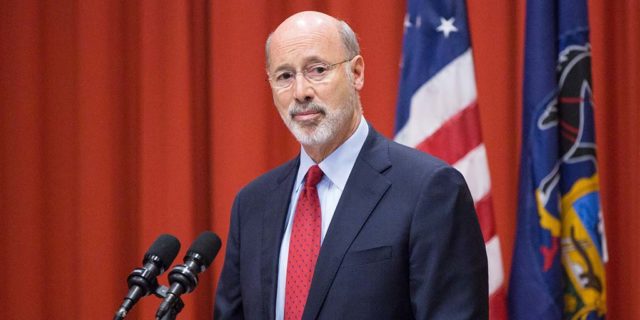Harrisburg, PA – Governor Wolf made voting more convenient and secure by signing Act 77 of 2019, the most significant improvement to Pennsylvania’s elections in more than 80 years. The bipartisan compromise legislation takes effect for the April 2020 primary election and makes Pennsylvania a national leader with voter-friendly election reforms.
The law creates a new option to vote by mail up to 50 days before an election and be placed on a list to permanently receive a ballot application by mail. It also provides more time to register to vote and authorizes a $90 million bond to help counties fund the purchase of new voting systems with a paper trail that strengthens the security of our elections.
“This bill makes voting more convenient and more secure for millions of Pennsylvanians and continues my commitment to modernizing our elections,” said Governor Wolf. “This is the biggest change to our elections in generations and will strengthen our democracy by removing barriers to the voting booth and encouraging more people to vote. I applaud all of the legislators and stakeholders for their work with my administration and their spirit of compromise.”
Increasing the opportunity to vote increases turnout. According to a U.S. Government Accountability Office report in 2016, providing more days to register to vote and no-excuse mail-in ballots increased voter participation by more than four percent. That is nearly 250,000 votes in Pennsylvania.
No excuse mail-in voting
The law creates a new option to vote by mail without providing an excuse, which is currently required for voters using absentee ballots. Pennsylvania joins 31 other states and Washington, D.C. with mail-in voting that removes barriers to elections.
50-day mail-in voting period
All voters can request and submit their mail-in or absentee ballot up to 50 days before the election, which is the longest vote-by-mail period in the country.
Permanent mail-in and absentee ballot list
Voters can request to receive applications for mail-in or absentee ballots for all primary, general and special elections held in a given year. Counties will mail applications to voters on the list by the first Monday of each February. Voters who return an application will receive ballots for each election scheduled through the next February. Pennsylvania is the 12th state to provide voters with the automatic option.
15 more days to register to vote
The deadline to register to vote is extended to 15 days from 30 days before an election. Cutting the current deadline by half enables more people to participate in elections. The new more flexible and voter friendly deadlines provide more time to register to vote than 24 other states.
Extends mail-in and absentee submission deadlines
Voters can submit mail-in and absentee ballots until 8:00 p.m. on election day. The current deadline is 5:00 p.m. on the Friday before an election, which is the most restrictive in the country. Pennsylvanians submitted 195,378 absentee ballots in 2018, but 8,162 – more than four percent – missed the deadline and were rejected. The national average is only two percent.
The changes do not impact the November 5, 2019 election.
“The bill modernizes our antiquated voting laws. Now a voter’s kitchen table can become their voting booth, and researching candidates can be done in real time,” said Senator Lisa Boscola. “SB 421 puts the political parties on the run, and gives voters more control. This law will bring polling to the people, and that is closer to a modern democracy: no excuses and no exclusions.”
“The people of Pennsylvania have sent divided government to Harrisburg and, with that, this is what governing looks like,” said Senate Majority Leader Jake Corman. “We are thankful for the governor’s willingness to work with us to enact the most historic change in how we cast votes since the election code was enacted in 1937. Compromise has given Pennsylvanians a modernized election code that preserves the integrity of the ballot box and makes it easier for voters to choose the people who represent them.”
“This bill was not written to benefit one party or the other, or any one candidate or single election,” said House Majority Leader Representative Bryan Cutler. “It was developed over a multi-year period with input of people from different backgrounds and regions of Pennsylvania. It serves to preserve the integrity of every election and lift the voice of every voter in the commonwealth.”
The law also authorizes the governor to pursue a $90 million bond to reimburse counties for 60 percent of their actual costs to replace voting systems. The new systems have enhanced security to help guard against hacking and produce an anonymous paper record so voters can verify their ballot is correctly marked when casting it. Paper records also allow officials to conduct the most accurate recounts and audits of election results.
“Voters in Pennsylvania won for this election and elections to come,” said Micah Sims, executive director, Common Cause Pennsylvania. “This package provides the infrastructure of new voting machines to produce secure elections and now we have some good reforms that will create greater engagement and participation.”
“This commitment of $90 million is crucial for counties who are continuing to work to meet requirements to purchase new, voter-verifiable paper trail elections systems by April 2020, and we thank the Administration and General Assembly for their partnership in securing this funding,” said Kathi Cozzone, CCAP president and Chester County commissioner. “Ultimately, the winners are our mutual constituents – both voters and county property taxpayers.”
In April 2018, the Department of State informed counties they must select the new voting systems by the end of 2019 and the new system must be used by voters no later than the April 2020 primary election. At least 52 counties, or 78 percent, have taken official action toward selecting a new voting system. And 46 counties, or 68 percent, plan to use their new voting system in the November 2019 election.
Earlier this year, Governor Wolf launched an option for Pennsylvanians to request absentee ballot requests online for the first time. In his first term, Pennsylvania launched online voter registration, which more than 1.5 million Pennsylvanians have used since 2015.
Pennsylvania ranks 25th for voter participation with 51 percent of the eligible population voting in the 2018 election.









